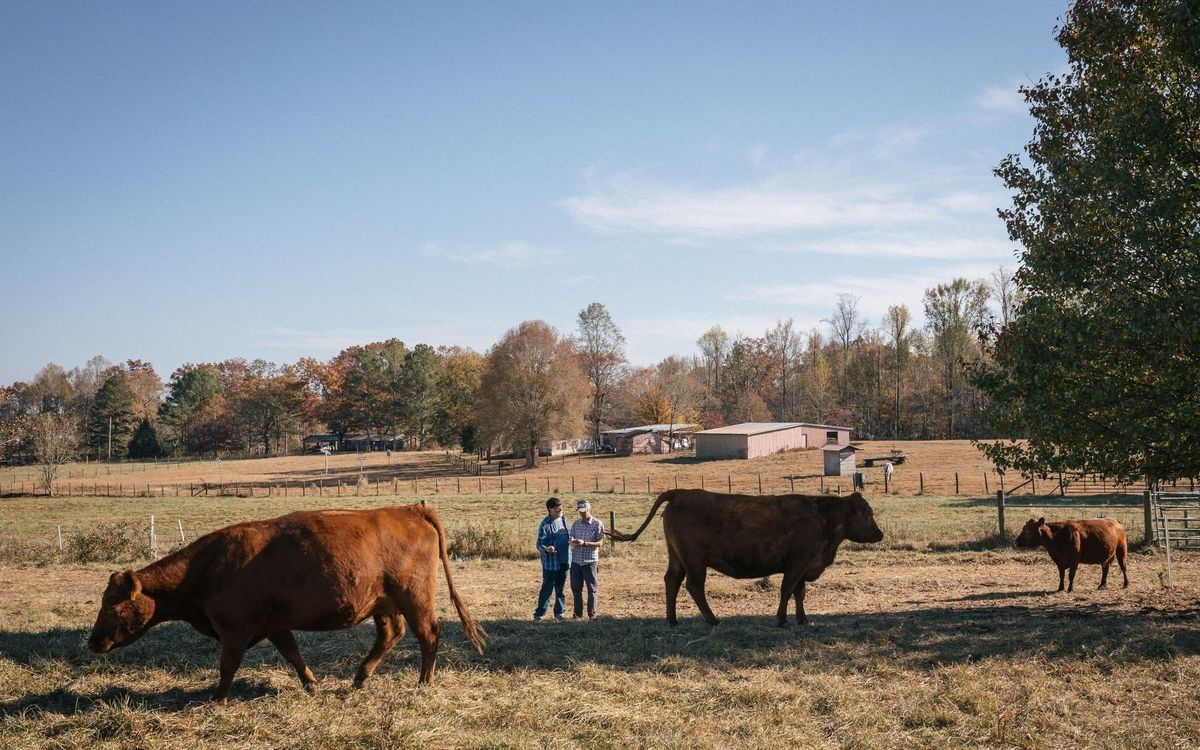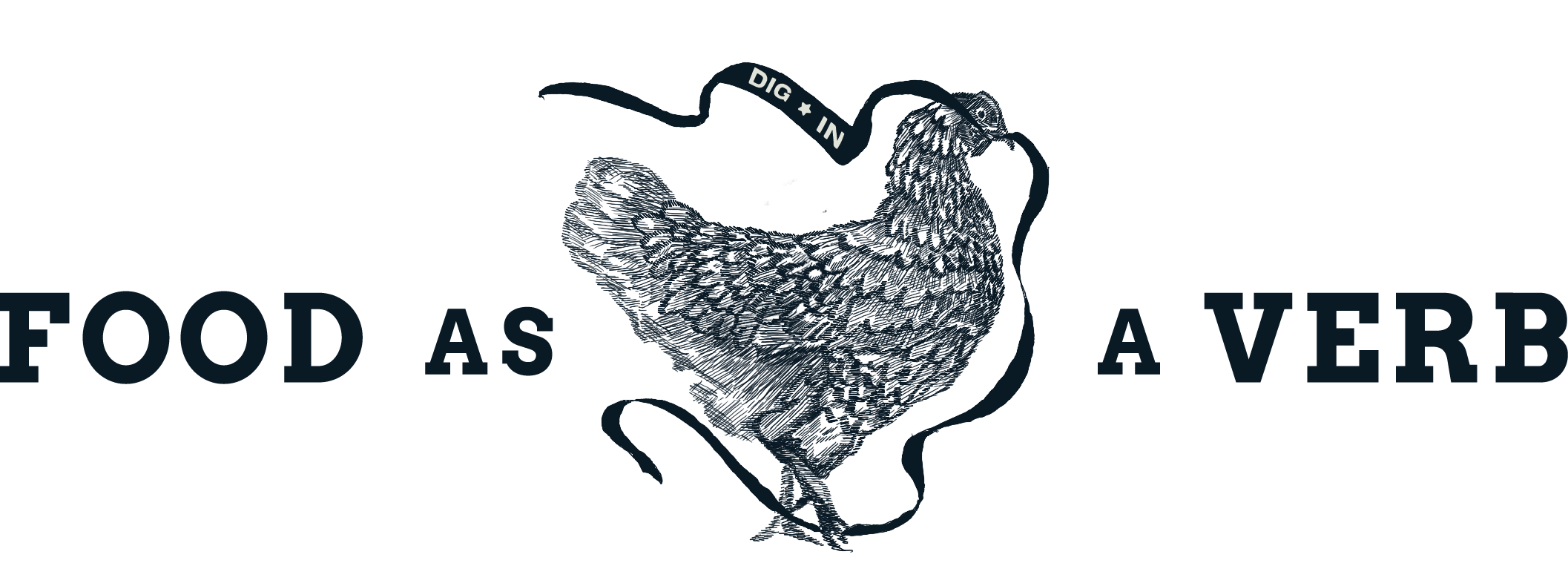The Southern Mama Cow: Teddy Gentry and the cows that will save Southern cattle farming.
This country superstar has been working a second job: breeding cattle, stewarding the land and cultivating dung beetles. Lots of them.


"We will be the breed of the South."
When Teddy Gentry climbs out of his truck – a white Ford, windows down, an Old Lives Matter coffeecup on the dash and scattered papers in the center jump seat – he's wearing a Life is Good t-shirt under unbuttoned flannel, moving like he has all the time in the world for you, a country superstar who sure doesn't act like it.
You get the immediate impression that there is no impression. Gentry, known all over the world, could easily be the guy in line at Walmart or passing the collection plate on Sunday.
No airs. No entourage.
"Hey there, young fellas," he said.

Gentry, 71, is a founding member of the Alabama band, among the most decorated and awarded country bands in American history. Since 1980, Gentry – bass player, songwriter, harmony vocals – and bandmates are responsible for 21 straight #1 hits and a canon that's earned them the highest Hall of Fame honors.
This entire time, though, Gentry's been working a second job.
He's a cattle farmer.
But not just any cattle.
At Gentry's Bent Tree Farms in Ft. Payne, where 300 head of pure bred South Poll cattle graze – herds moved daily, no pesticides, soil so healthy cow-pies are gone in two weeks, three tops – he's attempting to redefine and revolutionize cattle farming in the South.
"We will be the breed of the South," he said.

In the early '80s, as Alabama began to release "Tennessee River" and "My Home's in Alabama", a young Gentry got his first royalty check from RCA. He cashed it, buying his grandfather's 60 acre cotton farm.
"I love my family farm and just wanted a piece of the old home-place. That’s where I was raised. That little white house," he says, pointing across the road.


Bent Tree Farms, Gentry home-place, Ft. Payne, Alabama
On those 60 acres, he put 20 or so Herefords.
But something else started itching.
"Long about somewheres in '83 or '84, I decided I wanted to study cattle," he said.
Gentry scoured newspapers, farming magazines, word of mouth, this old timer here, that old timer there; even now, he names them off – Roy Beeby in Oklahoma, Frank Felton in Mississippi, Bob Crane in Florida – like they're the celebrities, not him.
"We'd have a concert that night, but in the day, I'd drive out to a farm. I'd rent me a car, pick their brain," he said.
Alabama toured; he studied.
"I put myself through college in the back of the bus in my own humble way," he said.
Soon, an idea emerged. Gentry came home one day, told his wife what would become prophecy: we need a new breed of Southern cattle.


Bent Tree Farms, Teddy Gentry, Ft. Payne, Alabama
Bent Tree Farms is named for the indigenous practice of using saplings to point direction. "They used to bend saplings over," he said.
Similarly, something was calling Gentry, pointing him in this new direction.
Naysayers booed. Cattlemen and musicians both criticized.
"People thought I was a musician who couldn’t do shit with cattle," he said. "But I had a firm goal in mind."
He drew up a composite of desirable traits in Southern cattle.
- Heat-tolerant.
- Low-maintenance.
- High fertility and longevity rates.
- Approachable. Not wild. Calm. Not skittish.
- And delicious, tender meat.
"At a time, there was not a breed fit for the South," he said.
Gentry began to change that.
But he wouldn't do it alone.

Dave Roberts is Bent Tree's farm manager, a fourth-generation cattle farmer – his great-grandfather also trained circus elephants and lions – who moved to Ft. Payne in the late 90s from Illinois.
"It's all I've known," Roberts said of cattle-farming.
Roberts – not a rushing bone in his body – is kind, inviting, a curious storyteller. Keeps you guessing. Sometimes, his stories would last four words.
Me: why'd you come to Ft. Payne?
Him: I knew a guy.
Other stories?
Take this one: out in Arizona, there's a hearty desert breed of cattle called Barzonas.
"You may not see them but for twice a year out in desert," Roberts began.

"So I was talking to this man in Arizona who ran Barzonas," Roberts began. "He had 10 bulls. I asked him:
How do you keep them from fighting? Do you have a pen?
Yes, the guy said.
How big is it?
About 500 acres.
"That was his idea of a pen."

So, back in the mid 80s, Gentry – wanting that tough-desert-no-maintenance cow – bought a few hundred Barzonas.
Then, he was drawn to heat-tolerant breeds that required very little maintenance. Heard about Senepol, a red Angus in the equatorial Virgin Islands.
The red coat reflects heat; black absorbs it.
So, Gentry bought few hundred Senepol.
He knew this new cattle had to produce tender meat. One breed kept showing up among most tender.
Red Angus.
A few hundred of those.
And, well, he and his wife just love Herefords, so a few hundred of those, too.

Along with Roberts and other experts, they began breeding them, carefully, with meticulous records and care, keeping the top one or two percent of calves, breeding towards four traits:
Heat tolerance.
Low maintenance.
High fertility rates.
And gentle.
"As kittens," Gentry said.

In 1997, they registered the first South Poll breed, originating from a stock of 1/4 Hereford, 1/4 Red Angus, 1/4 Senepol and 1/4 Barzona.
"The South Poll," Gentry said. "The Southern Mama Cow."
Today, they've achieved pure bred status. Each herd is self-populating, breeding South Poll to South Poll.
The South Poll Association has more than 700 members; South Polls are purchased from farmers all across the US.
Like Bob Gray of Bluebird Mountain Farms on Signal Mountain.
"They're gorgeous," Gray said.
Last week, two South Poll calves were delivered to his nine acre farm, joining three Black Angus. Gray, a former National Park Ranger (and friend), sells half-shares off his grass-fed cattle. A member of the Tennessee Cattlemen's Association, he'd has his eye on South Poll for a while, for exactly the reasons Gentry wanted.
"They're bred specifically for grass grazing, Southern heat and they're a smaller framed animal and you can have more of them on the land," Gray said. "They're docile, bred and chosen for maternal instincts, good pregnancy rates, good birth weights and weaning rates."

South Poll, Bent Tree Farms, Ft. Payne, Alabama
South Poll cows are intentionally smaller, allowing more animals on less land. They graze on grass, not grain.
"No grain," said Roberts. "None."
Not long ago, a farmer in Washington called; his South Poll cows are recording 98% fertility.
"That's what we're most proud of," Gentry said. "Fertility and longevity. They far outweigh any other traits. That’s what makes the commercial man money."
If you purchase South Poll, you agree to stated by-laws: no competitions.
"No show cows," said Gentry.
Why?
"It doesn't help the breed," he said. "It's a beauty contest. The judge can't look at a heifer and make you money. The only thing that can do that is a well-kept set of records."

We walk out into the fields, among the 100 or so cows. It is immediately calming, standing among these big-red-bodied-animals, chewing cud, swishing flies, inhaling, exhaling, some in the sun, others under the shade tree.
Most ignore us.
Except one.
She raises her head. Looks at us. Kinda skittish.
We walk closer.
She runs away.
One out of 100.
"Sell her," Gentry immediately says to Roberts.
Why?
"I can't put up with that. I stand for cows being gentle and tender. I can't let one calf ruin that," he said. "You see any other animal looking at you? She shouldn't be looking at you."
We walk, he and Roberts talk.

Look at the body shape she's got.
Look at her. You couldn't draw a more perfect udder on a cow.
That's a $20,000 cow.
This is not arrogance; it is love. For three decades and against all odds, Gentry has been building this love story of devotion: to the South, to cattle, to young farmers.
"We're about doing the right thing. Not bullshitting people. Making it during hard times, making it during good times," he said.
Gentry kept circling back to this main point: breeding cattle that will help farmers make money.
"We’re not the fastest. We’re not the largest. We’re not the tallest," he said. "But we think we are the most money-making breed out there."
Then, the conversation turned to cow shit.

When Gentry bought this farm, the soil was dead.
"DDT," said Gentry. "You couldn't find an earthworm or dung beetle for a half-mile."
They discontinued all pesticides. Began adding fish emulsifier and sea salt to the fields. Began rotationally grazing, moving the herd every day or so.
"That’s how we mimic what buffalo did," Roberts said.
And no Ivermectin.
"If you give a cow Iverc, whenever that cow poops for the next few days, it will kill all the earthworms or dung beetles in that area," Gentry said.
Today, the land is rich and fertile. In the middle of this drought, they say they're retaining twice as much rainfall as conventional farming. We stop by a fresh pile of cow dung.
"Two weeks after this cow pie hits the ground," Gentry said, "we want it to be gone. There are 1200 different dung beetles in the world and we want as many as we can have here."
Here in Ft. Payne, Gentry's been practicing aspects of regenerative agriculture for decades.
"Farmers doing this are more than contributing to the positive side of things," he said.

This is the future of Southern cattle farming. With drought and heat increasing, South Polls are a present-and-future breed for the South.
Both Gentry and Roberts are in their early 70s. Alabama still plays concerts, including next month in Huntsville. As Gentry heads back to his truck, I give him one more question:
Are you prouder of your work as a musician or cattle farmer?
"I think I do more for an industry with cattle than I have done for music," he said. "I leave something behind that young farmers can make a living with because of my work for 30 years."

All photography by Sarah Unger. Visit SarahCatherinePhoto.com
Story ideas? Interested in sponsorship opportunities + supporting our work? Feedback or questions? Email David Cook at david@foodasaverb.com. This story is 100% human generated; no AI chatbot was used in the creation of this content.
Food as a Verb thanks our sustaining partners for their generous support.





Female-and-locally owned, Divine Goods offers beautifully curated gifts for every occasion. Be divine and send someone special a Divine Goods gift - locally sourced when possible, and always thoughtful. Now open in St. Elmo, Little Coyote blends together Texas barbeque, Cuban, Caribbean and Southwestern influences – smoked meats, stunningly original tortillas, 100 varieties of tequilas, sotols and mezcals – for a family-style restaurant experience unlike any other in Chattanooga. Niedlov's Bakery & Cafe, a Main St. anchor, has elevated our city's bakery experience to beautiful levels while strengthening community in immeasurable ways. Tucker Build offers Chattanooga a commercial construction firm made up of design-build experts specializing in the planning, building and managing process. For more than 25 years, Lupi's has served locally-sourced, creatively made and award-winningly delicious pizza pies from five nearby locations.
